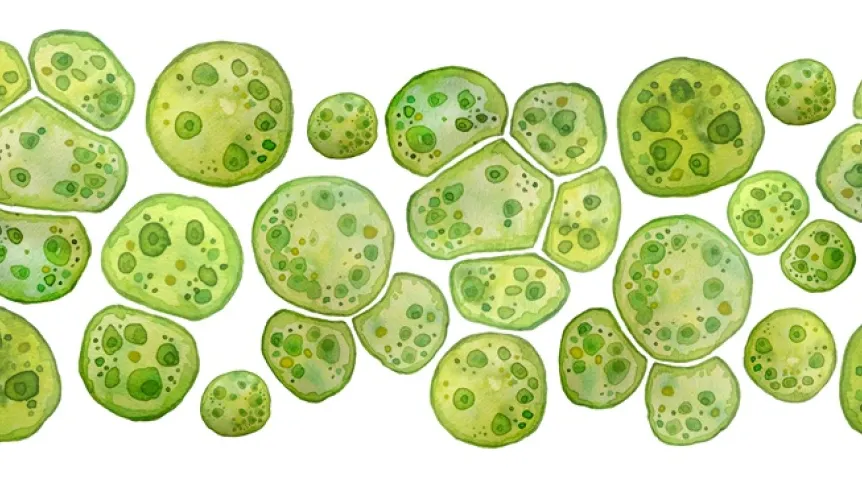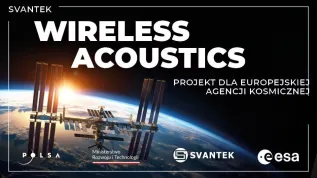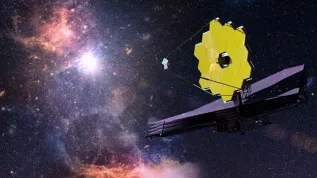
The International Space Station will be the staging area for an experiment with algae that naturally live near volcanoes. The experiment has been developed by a start-up founded by a doctoral candidate from the University of Warsaw. Algae are universal organisms that could be used in the future to produce oxygen for astronauts and perform other important tasks, scientists say.
The European Space Agency has already signed seven contracts to conduct Polish research projects on the International Space Station. The University of Warsaw reports that an experiment led by Ewa Borowska, a doctoral candidate at the College of Inter-Faculty Individual Studies in Mathematics and Natural Sciences, will be sent to the ISS.
The 'Space Volcanic Algae' project concerns extremophilic (living in extreme conditions) microalgae that live in volcanic regions.
The researcher whose majors include oceanography has been dealing with algae since 2017. The planned experiments will be a continuation of the work carried out by her start-up Extremo Technologies, which tests the ability of the mentioned algae to produce oxygen. The goal of the experiments conducted in orbit will be to check the possibility of their adaptation to life in space - in microgravity and under the influence of cosmic radiaton.
Scientists explain that in the future algae could be used to produce oxygen for astronauts.
'The aim of our experiment is to send such microorganisms - in our case, microalgae from volcanic areas with unique adaptive features - and test them for resistance in conditions of microgravity and cosmic radiation. This will allow us to better understand their functioning under many stress factors at the same time', says Borowska. 'In addition, the primary goal of our project is to investigate oxygen production, as the proposed algae exhibit intensive photosynthesis, and thus produce oxygen and absorb carbon dioxide'.
These organisms will be tested on the ISS for the first time.
The sensor that registers the level of oxygen production has been designed by specialists from the University of Tartu (Estonia). The project is the responsibility of an international team, whose members include: the CEO of Extremo Technologies, Wiktoria Dziaduła - mission manager, and Dr. Weronika Urbańska - chief science officer at Extremo Technologies and senior mission engineer.
ICE Cubes Service will be responsible for implementing the experiment in the Axiom-4 mission on the International Space Station, the University of Warsaw reports.
So far, scientists have completed preliminary tests of algae adaptability. They say that the species they have selected are multi-tasking (so-called all-in-one) organisms that can be used for many purposes - in addition to producing oxygen and other (nutritional or medicinal) substances, also, for example, to recover metals from the lunar or Martian regolith, or in sewage treatment.
'Algae will be one of the key components of closed loop systems on future space stations and space bases. They are rapidly growing organisms with low energy and nutritional demand. They are not only the basis for oxygen production and carbon dioxide conversion, but their biomass can also be a potential fertilizer for plants, food for simple forms of invertebrates and, finally, an additional supplement to the astronauts' diet', says Borowska.
'In addition, the study of new species of algae, such as the one we propose, may demonstrate the production of completely new metabolites and nutrients that can be used in various fields, including space medicine and biotechnology', she adds.
Meanwhile, ESA has already signed seven contracts with Polish institutions and companies to carry out experiments on the International Space Station. These projects vary in topic. They will include research on the impact of long-term stay in space on human mental health, the operation of advanced AI systems in low gravity conditions, and monitoring the noise level on the ISS. They will be implemented as part of the Polish Mission to the ISS, which, as the experts from the University of Warsaw emphasise, means new opportunities for the development of Polish science and Polish space technologies.
PAP - Science in Poland, Marek Matacz
mat/ zan/ kap/
tr. RL













